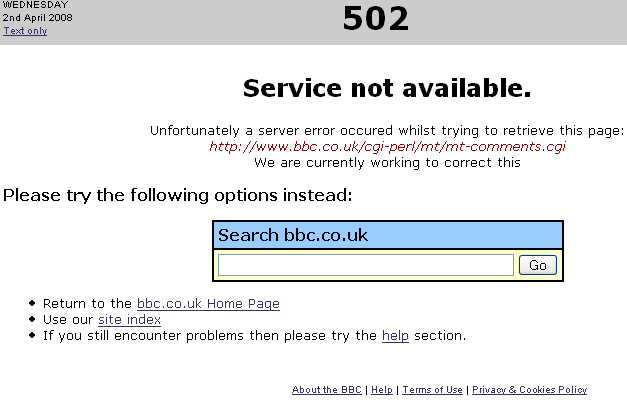How to make sure much of the conversation is being lost in the shuffle; or
what it takes to stop the conversation before it had a chance to start
What to do to stop the conversation from continuing when using social media tools. BBC has its own blogs, of course. These are successful destinations for many listeners of BBC News. One of the impressive things is that whilst postings are rarely in depth or providing additional beef for readers, the number of comments they seem to get is very impressive indeed.
Ever tried to comment on a blog posting, TV soap or newscast aired on BBC? Well, you are in for a little surprise. Before posting your comment, you will come across a small paragraph just above the comment box stating:
On occasion, you may experience problems when leaving a comment. We are working on a solution to this – you can find more details here.
Naturally, wanting to post a comment I was not thrilled to read this at all. Worst was when it plaid out with me as well and I saw this screen.

Viewing the the BBC Error 502 screenshot properly
Therefore, after about 10 times trying without any success, most readers or viewers will just move on. Another conversation or attempt to comment has been lost in cyberspace.
Is this a BBC Issue Only?
The BBC audience is not satisfied with this situation judging from the comments one finds on the BBC website and elsewhere on the Web (i.e. negative publicity for BBC – damages the brand). Worst is that the problem has been known for more than year. What caused this problem according to the BBC News editors was something to the effect:
Nevertheless, I can only imagine, how many comments are not making it onto the Website based on the experience I had last week Wednesday when I tried.
For most bloggers, this is a non-issue
In fact, most of us are happy if we get 2 people to comment for each post. In addition, if these comments are thoughtful by adding more beef to the equation, we might just be ecstatic. Most comments on BBC’s sites or on many of the high traffic blogs are just noise but do not add quality and insights to the conversation. Accordingly, many comments seem more like venting than thoughtful reflection.
We find lots of chatter or noise, such as “great post – I have thought about this as well and you say it great.” We will focus on this matter in an upcoming post.
Adding fluff or chatter makes us waste more time and possibly feel we know more but our understanding of the issues may still be as lousy as it was yesterday:
Daily Me – Benchmarking Arianna Huffington
Of course, some gurus like Jakob Nielsen do not allow comments at all on their bi-weekly posts. Nevertheless, Jakob has always said that a corporate blog was a waste of time. This is, of course, a viewpoint you can argue with him about. We presented Jakob and Bryan’s opposite points of view on this post here:
why Jakob Nielsen and Bryan Eisenberg may both be right
Bottom Line
One of Scoble’s 9 attributes he lists for describing the difference between social or new media and traditional media, such as the newspaper or TV is this one:
… you can’t interact at all when traditional media is being used – newspapers or TV
As the BBC shows, this Scoble statement is not very accurate. You can interact with the journalists and newspaper makers ever more often (e.g., send them an e-mail). Nonetheless, looking at a newspaper such as the New York Times one might forgive Scoble for coming to the above conclusion. With the NYT, most articles published online have neither an option for writing a comment nor a feedback button. Hence, nothing like a ‘conversation’ is or can be happening – except for writing a Letter to the Editor:
New York Times – N.Y. / Region
As the BBC shows, however, increasingly traditional media tries to give readers or listeners a chance to provide their say in form of
– your Letter to the Editor will appear if there is space in an upcoming newspaper,
– Bulletin board
– Comments made at the bottom of the article published online
– same article also in print
– Participate in forum (put up online, such as, Iraq war)
Not all of the above are available for each article, of course. Moreover, yes, it is the ‘old’ media trying to use ‘new’ media effectively, in order to expand the feedback or conversation part. Nevertheless, you can always write a letter to the editor (using e-mail or the special form offered online to do so) for most of the larger newspapers in Europe or North America.
With the above three additional options besides the Letter to the Editor, traditional media is trying to join the conversation. Nonetheless, if you offer any of the above options to your readers for communicating with you, they had better work. Unfortunately, in the case of BBC, the technology has failed to work properly for more than a year – and the BBC has not been able to fix the problem.
Therefore, not just corporate brands are being challenged to use social media effectively. Even printed media or TV is on a learning curve. What this taught us here at ComMetrics is that you do not want your client to be unable to contribute and participate in the conversation.
Trying unsuccessfully repeatedly last week being each time shown error message 502 was not a nice experience for me. Okay, maybe BBC gets away having a technology frustrate its audience/participants for more than a year. In case of your company, forget it. Your clients will not stand for it. Get it right or don’t do it.
Pingback: Tidbit about BBC News Blogs Posting Comments is a Nightmare | Wood TV Stand